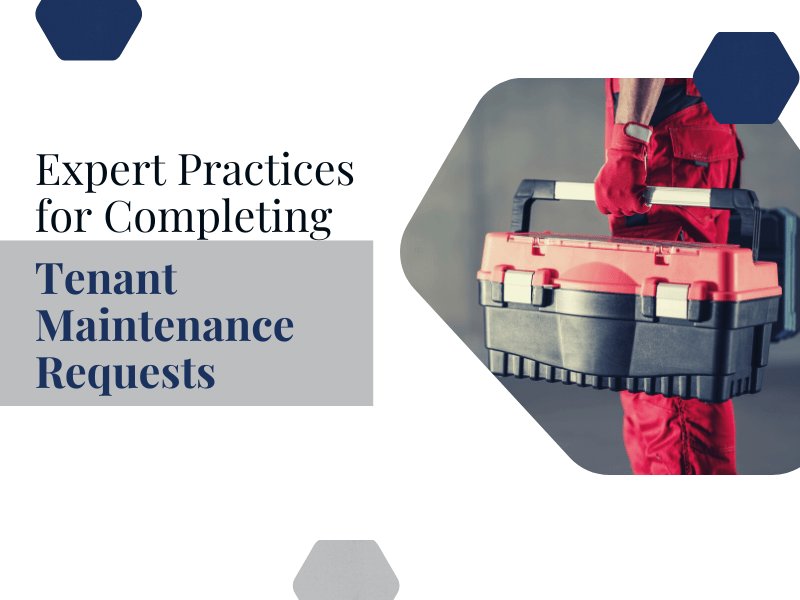
Maintenance requests are going to come in when you’re providing a Roanoke rental property. Even if your property is very new and even if it’s already in great condition. Tenants will be living there. They’ll be flushing toilets and running dishwashers and doing laundry and opening and closing doors, windows, cabinets, and drawers. Things will break. They’ll need to be repaired and replaced.
When we talk about preparing for maintenance, we’re usually talking about budgeting.
There’s something else to prepare for, though, and that’s how you’ll handle the requests that come in from your tenants. Whether they’re calling to report a fire or a broken set of blinds, you should have a process in place for responding to those requests.
A good maintenance response will protect the condition of your home, and it will also increase your tenant retention.
Both of these things help your ROI.
If you’re not working with a Roanoke property manager, and you need some help putting together a process for handling maintenance requests, we have some ideas that come from our years of experience.
Once you have your process in place, make sure it’s in writing. Ideally, you’ll include the maintenance request process in your lease agreement so tenants can easily access it when they need to let you know something’s wrong.
Emergency Maintenance in Roanoke Rental Homes
Before you can put together a process for reporting emergency maintenance, you’ll want to be sure your tenants understand what emergencies are. When something breaks at their home, it’s easy to believe it’s an emergency no matter what. But, a toilet that’s acting tricky is actually not an emergency if there is another toilet or two in the property.
There will likely be different ways of reporting needed repairs, depending on whether it’s an emergency or a routine fix. Be specific about what qualifies as an emergency, because those are the calls you’ll be getting in the middle of the night or over the weekend or just as you’re sitting down to Thanksgiving dinner.
Emergencies generally involve floods, fire, or sewage. An emergency is no heat in the winter or no running water. A water heater that’s exploded or a tree falling through the roof are both emergencies.
You will want your tenants to call you as soon as it is safe to do so. In dire emergencies, they may need to call 9-1-1 first. Once that’s happened, they should contact you using whatever emergency phone number you provided to them.
First, make sure the emergency doesn’t have an opportunity to get worse. If a pipe has burst inside the house, turn off the water. It helps if your resident knows where to find critical things such as the water and gas shut-offs.
Once the initial damage is done and the crisis is stopped, the appropriate restoration methods can be undertaken. This is where the damage will be assessed and some context will be given to the overall situation. Water restoration companies can be called, for example. Insurance claims can be initiated.
You’ll need to know who to contact and how to deal with the immediate response according to the situation. Stay calm, keep your tenants calm, and handle things one at a time.
How Should Tenants Report Routine Repairs in Roanoke?
Emergencies, for obvious reason, require immediate action and necessitate a phone call.
For routine repairs, there’s a better way to establish a maintenance request process.
Routine repairs are likely inconvenient. They still need an efficient response. But, there’s no immediate risk to life or property with these types of issues, so you can allow for a written and documented request system.
Most Roanoke property management companies have an online tenant portal, where residents can make routine requests when something is wrong or needs attention. These repairs are often responded to in a day or two, so nothing is delayed. But, the process of putting the request in writing is valuable for many reasons:
- It allows tenants to make requests on their own time. They don’t have to worry about waiting until normal business hours or bothering you in an evening.
- It documents when the request came in.
- It allows tenants to be as detailed as possible in describing what is wrong. Pictures and videos can even be uploaded in tenant portals to show what’s going on.
- There’s a record of how the repair was handled. You have a written timeline and a sequence of events that can protect you if a tenant claims a repair was not made. It also helps you plan for when preventative maintenance may be needed going forward. If you’re trying to decide when to replace a refrigerator, for example, you can review how often you’ve had to fix it in the last year or two.
As an independent landlord, you may not have access to the technology that allows for an online portal. But, you can still accept the request in writing. Ask tenants to email you or send a text message. You can use any messaging app, really, to collect and organize maintenance requests.
Remember to respond to those routine repairs with the same sense of urgency you would an emergency. There’s no sense in waiting. You’ll only frustrate your tenants and put your property at risk for needing more work.
Relationships with Licensed and Insured Vendors
Every maintenance process depends on good vendors.
You can’t respond immediately to emergencies without a team of reliable and professional vendors and contractors on your list of preferred workers. It’s important to establish these relationships ahead of time. When there’s an inch of standing water in your rental property, you don’t want to be contacting a plumber for the first time. You want someone who knows you and has been to your property before.
Preventative maintenance plans can help you achieve the goal of assembling a great list of vendors. When you contract for ongoing services, you will have someone in your contacts who you can get in touch with right away. For example, if you have your HVAC system serviced every year, you’ll know exactly who to call if the heat goes out or the thermostat stops working.
We recommend you always work with licensed and insured vendors. A handyman is fine when you need someone to paint or change locks or re-set garbage disposals. But, when there’s a major maintenance concern at your home, make sure you’re working with someone who can show workers compensation insurance and the proper licensure. This will reduce your risk and ensure a high quality of work.
Document Your Process in Your Lease Agreement
 Now that you know how you’re going to structure the maintenance reporting process – put it in writing.
Now that you know how you’re going to structure the maintenance reporting process – put it in writing.
Documented procedures are always a better idea for you, your tenants, and your property. There’s no point in keeping it all in your head. When you have a written process, you know it’s consistent and you can refer to it when you want to double-check something, make improvements, or update how things are done.
The lease agreement is the best place to house your maintenance response process. You can highlight this section of the lease agreement when you’re discussing it with tenants, before they sign the lease and make plans for moving in. Reinforce what you expect throughout the tenancy.
The lease is also the right place to outline who is responsible for which items when it comes to maintaining your property. As the landlord, you’ll be responsible for maintaining the major systems and functions of the home. You’ll have to keep the air conditioning, heat, plumbing, and electric in good condition.
There are things you can expect from your tenants, however, and those should be referenced in the lease agreement. For example, to protect your HVAC system, have your tenants change the air filters regularly. You can also require that they change any light bulbs or batteries in remotes.
Be clear, also, about what you don’t want tenants to do. There’s a lot of risk in allowing them to make their own repairs. You don’t want tenants climbing ladders or dealing with dangerous electrical issues.
One thing to be absolutely clear about is that you want to be notified right away if something breaks or needs maintenance. Sometimes, tenants will hesitate to report maintenance issues. They’ll worry that they’re going to get blamed. Maybe they won’t want to bother you for a repair that they see as unimportant.
Deferred and unreported maintenance is always more expensive than an immediate response, however. Write into the lease agreement that tenants are responsible for reporting maintenance immediately.
A good maintenance response leads to a better rental experience for everyone. Don’t handle problems as they come up. Instead, have a documented system in place that you can share with your tenants so everyone is on the same page. Maintaining your property requires a team approach.
Please contact us at Lawson Realty Group when you’re thinking about your process for maintenance requests. We manage properties in Southwest Virginia throughout the Roanoke Valley, including Salem, Cave Spring, Hollins, Vinton, Glenvar, and Southwest Roanoke County.
